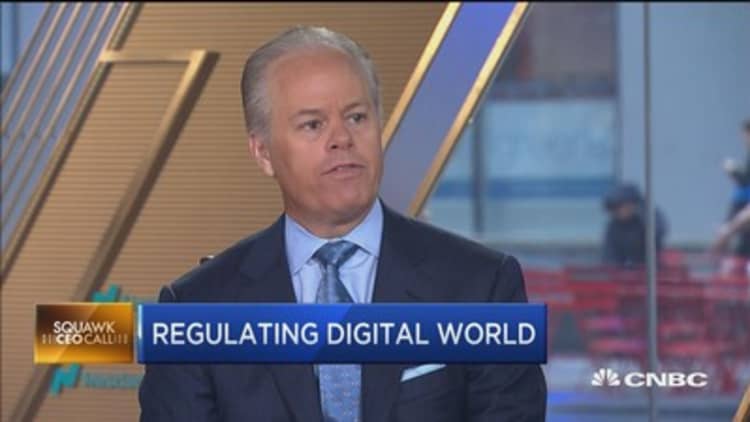In April, pressured by new privacy rules in Europe, Google told advertisers they would no longer have access to some critical measurement data when building online campaigns.
Digital ad company Trade Desk is reaping the rewards.
Trade Desk shares soared 32 percent on Friday, a day after the company reported earnings that blew by analysts' estimates and raised its forecast. On the conference call with analysts, CEO Jeff Green said one of the primary drivers in the quarter was Google's move on privacy, which pushed advertisers to Trade Desk.
Here's what happened. In conjunction with the General Data Protection Regulation (GDPR) that the European Union implemented in May, Google told clients that they could no longer have access to the DoubleClick ID to analyze ad measurement data across the web.
The data is highly valuable because it allows marketers to see how ads are performing on Google sites, including YouTube, compared with the rest of the web. For example, an advertiser could see that, based on a user ID, a particular person was on YouTube and a number of different sites, and could tell where promotions were working and where they were falling flat.
In addition to taking precautions related to GDPR, Google is facing greater scrutiny in the U.S. because of the ways large platforms like Facebook and YouTube have been manipulated by foreign actors to influence consumers, particularly when it comes to political elections. Green cited the Cambridge Analytica scandal twice during Thursday's conference call, which made clear how a third party was improperly using Facebook user data for ad targeting.
"In my view, Google's decision to remove this ID offering is driven by their increasing need to reduce risk against malicious data enablement, like what we saw Cambridge Analytica do with social data," Green said. "The risk is similar for both Google and Facebook. The risk exists because Google, at the fundamental level of their business, transacts in directly identifiable consumer data. Google knows so much about billions of consumers because of their core product, their search engine."
Green said that marketers are shifting to Trade Desk, because it gives them a neutral tool to see how campaigns are performing. Advertisers can "compare every destination on their media plan to every other destination objectively," he said.
Revenue at Trade Desk jumped 54 percent in the second quarter to $112.3 million, topping the $104 million estimate of analysts, according to Thomson Reuters. Earnings per share of 60 cents beat the 44-cent average analyst estimate. Trade Desk boosted its sales forecast for the year to $456 million from $433 million.
It's the second straight time that the company's stock price has surged after earnings. The shares jumped 43 percent on May 11, following better-than-expected results. The stock has almost tripled in the past six months to $125.66, giving Trade Desk a market value of $5.4 billion.

Green said that the advantage Trade Desk has in a highly sensitive data protection environment is that the company doesn't have a consumer product like a search engine or social network that requires it to collect personal information. Advertisers don't have to be concerned about the data they're using, because Trade Desk has no occasion to store social security numbers and medical data.
"And if you think about how sensitive some of the information is that you share with Google, and I mean in the search engine, right like any time you have a medical problem you do what I do, you go ask Google," Green said. "It's just anything that is sensitive like the details of your divorce, you're worried about your kids like anything you're going to type into Google."


